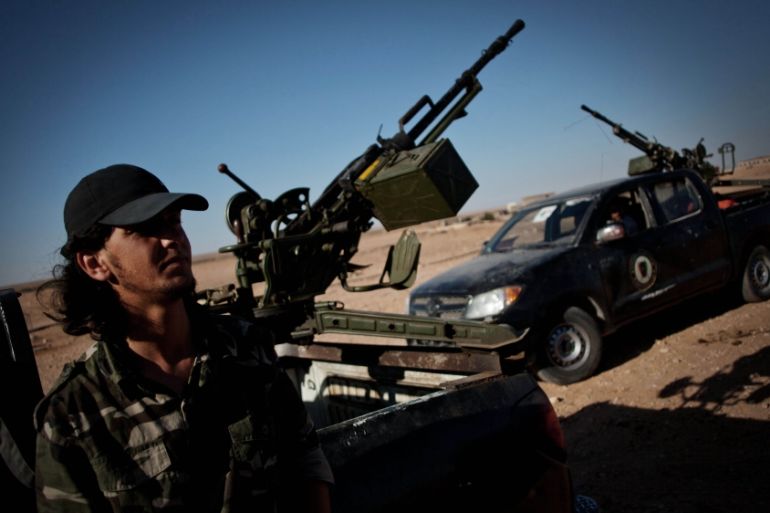Air attack on Tripoli airport delays peace delegation
Planes from UN-recognised government attack Libyan airport, delaying negotiators heading to Morocco for peace talks.

Warplanes from Libya’s UN-recognised government have attacked Tripoli’s only functioning commercial airport, temporarily stopping negotiators from travelling to Morocco for peace talks, officials have said.
The attack on Maitiga airport on Thursday caused no major damage but delayed a Tripoli-based delegation from attending the Rabat-based talks.
Keep reading
list of 4 itemsMoscow theatre attack suspects show signs of beating in court
Four men showing signs of severe beating charged over Moscow concert attack
Russia mourns Moscow concert hall attack victims as death toll rises to 137
Mohamed El Hejazi, a spokesman of forces allied to the UN-backed Tobruk-based government claimed responsibility for the attack.
“The strike is part of a war against terrorism that will continue until Libya has been freed of terrorism,” he said.
Libya’s legislators are split between the UN-recognised government in Tobruk and the General National Congress, a rival legally-installed government in Tripoli.
RELATED: What is not being discussed about Libya
Al Jazeera’s Hashem Ahelbarra, reporting from Rabat, said the UN expected talks to resume on Friday with special envoy Bernardino Leon scheduled to meet a delegation from Tobruk then the Tripoli-based government.
Ahelbarra said the UN-brokered peace talks were aimed at addressing the country’s political crisis, with the UN keen on the creation of a national unity government.
Our correspondent said the UN is aiming for a ceasefire, with the disbanding of militias and the formation of a national army so the country can focus on the fight against groups linked to the Islamic State of Iraq and the Levant (ISIL).
Thursday’s attack came days after officials in Zintan, a western region allied to Abdullah al-Thinni, the Tobruk- based prime minister, accused the Tripoli-based government of launching air strikes against its local airport.
RELATED: The rise and rise of Libya’s rogue general
Both sides are aligned with rival armed factions that have been fighting over territory and oil facilities while militias have exploited the chaos to carve out fiefdoms.
The country has been gripped by chaos since longtime leader Muammar Gaddafi was overthrown and killed more than three years ago.
The North African country has failed to build up a national army and efficient state institutions since the end of Gaddafi’s one-man rule, and is now effectively dominated by former rebel brigades who disagree over how to govern Libya and share its oil wealth.
The country’s three main cities, Tripoli, Benghazi and Misrata, are largely controlled by militias aligned with Libya Dawn, and supportive of Omar al-Hassi, the head of the legally-installed government in Tripoli.
According to the UN, at least 400,000 people have been displaced by fighting across Libya, with as many as 83,000 people living in settlements, schools and abandoned buildings.